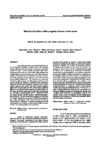Use este identificador para citar ou linkar para este item:
http://www.alice.cnptia.embrapa.br/alice/handle/doc/1036890Registro completo de metadados
| Campo DC | Valor | Idioma |
|---|---|---|
| dc.contributor.author | TEIXEIRA, A. L. | pt_BR |
| dc.contributor.author | SOUZA, F. de F. | pt_BR |
| dc.contributor.author | PEREIRA, A. A. | pt_BR |
| dc.contributor.author | OLIVEIRA, A. C. B. de | pt_BR |
| dc.contributor.author | ROCHA, R. B. | pt_BR |
| dc.date.accessioned | 2016-02-15T11:11:11Z | pt_BR |
| dc.date.available | 2016-02-15T11:11:11Z | pt_BR |
| dc.date.created | 2016-02-15 | pt_BR |
| dc.date.issued | 2015 | pt_BR |
| dc.identifier.citation | Ciência Rural, Santa Maria, v. 45, n. 7, p. 1228-1234, jul. 2015. | pt_BR |
| dc.identifier.uri | http://www.alice.cnptia.embrapa.br/alice/handle/doc/1036890 | pt_BR |
| dc.description | Due to high temperatures, practically all coffee farms in the state of Rondonia are of the C. canephora species. Thus, importing arabica coffee from other states becomes necessary for composition of blends, as well as for the specialty or gourmet coffee market. The purpose of this study was to select arabica coffee genotypes that exhibit satisfactory agronomic performance under high temperature conditions. The experiment was conducted in Ouro Preto do Oeste, RO, Brazil, with mean annual temperature of 25.8°C and mean annual rainfall of 2300mm year-1. The experiment was composed of 114 arabica coffee genotypes, with 103 progenies and eleven control cultivars, provided by EPAMIG. A randomized block experimental design was used with three replications, spacing of 3.0x1.0 meters and five plants per plot. All the crop seasons showed significant difference for the green coffee yield trait. In joint analysis, significant differences were detected among progenies and control cultivars. In the average of the four harvests, green coffee yield was 32.38 bags ha-1. The cultivars ‘Catuaí Vermelho IAC 1, Obatã IAC 1669-20 and Catucaí Amarelo 2SLCAK stood out, achieving yields greater than 40 bags ha-1 . The gain obtained from selection was 14.33 bags ha-1, which is equivalent to an increase of 44.04% in production of green coffee. The progeny H514-7-10-6-2-3-9 stood out with an average yield of 51.20 bags ha-1. In regard to maturation cycle, 56% of the progenies were classified as early maturity and 44% as medium maturity. Late maturity genotypes were not observed | pt_BR |
| dc.language.iso | eng | eng |
| dc.rights | openAccess | eng |
| dc.subject | Coffea Arabica L | pt_BR |
| dc.subject | High temperatures | pt_BR |
| dc.subject | Maturation cycle | pt_BR |
| dc.subject | Temperaturas elevadas | pt_BR |
| dc.subject | Tolerância ao calor | pt_BR |
| dc.subject | Ciclo de maturação | pt_BR |
| dc.title | Selection of arabica coffee progenies tolerant to heat stress. | pt_BR |
| dc.type | Artigo de periódico | pt_BR |
| dc.date.updated | 2016-02-25T11:11:11Z | pt_BR |
| dc.subject.thesagro | Café | pt_BR |
| dc.subject.nalthesaurus | heat tolerance | pt_BR |
| riaa.ainfo.id | 1036890 | pt_BR |
| riaa.ainfo.lastupdate | 2016-02-25 | pt_BR |
| dc.contributor.institution | ALEXSANDRO LARA TEIXEIRA, CPAF-RO; FLAVIO DE FRANCA SOUZA, CPATSA; Antonio Alves Pereira, Empresa de Pesquisa Agropecuária de Minas Gerais; ANTONIO CARLOS BAIAO DE OLIVEIRA, SAPC; RODRIGO BARROS ROCHA, CPAF-RO. | pt_BR |
| Aparece nas coleções: | Artigo em periódico indexado (CPATSA)  | |
Arquivos associados a este item:
| Arquivo | Descrição | Tamanho | Formato | |
|---|---|---|---|---|
| Flavio2015.pdf | 1,05 MB | Adobe PDF |  Visualizar/Abrir |









